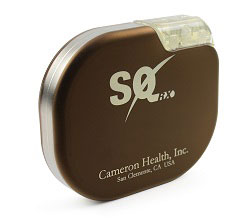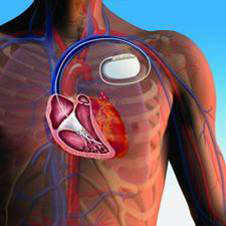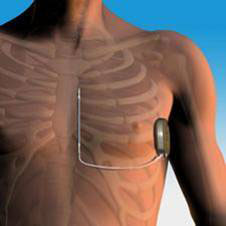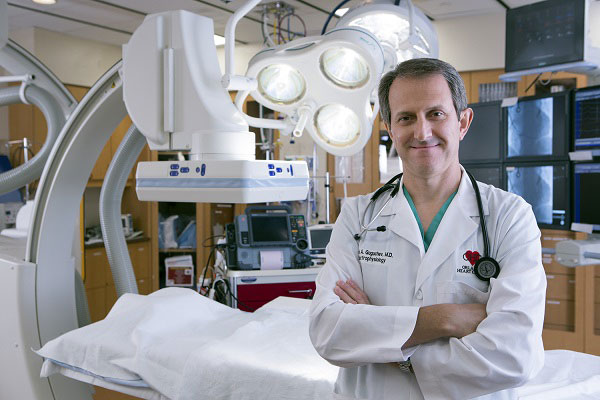Orlando Health Heart & Vascular Institute is first in the state to implant new defibrillator for patients at risk for sudden cardiac arrest
New technology gives high risk patients timely treatment when minutes matter most.
MEDIA CONTACT
Sabrina Childress321.841.8748
[email protected]
ORLANDO, Fla. (December 12, 2013) — For patients at risk for sudden cardiac arrest, a new defibrillator is like the standby ambulance and medical team they need when their hearts abruptly stop. Treatment within minutes is the critical difference between life and death. Orlando Health Heart & Vascular Institute is
the first in Florida to offer the advanced technology designed for patients unable to receive a traditional defibrillator. Pavel Guguchev, MD, and Roland Filart, MD, implanted the first device in the state on December 3.
The new defibrillator, the Boston Scientific S-ICD® System, is implanted just beneath the skin, leaving the heart and blood vessels untouched. When sudden cardiac arrest is detected, the device delivers a shock to the heart to stop the abnormal heart rhythm, reset the rhythm, and restore normal blood flow through the body. The device is less invasive than traditional defibrillators that are placed deeper inside the body along with wires inserted directly inside the heart.
 “The device’s greatest strength is that it reaches a group of patients who would otherwise not have an option, or who face only limited possibilities,” said Dr. Filart, electrophysiologist. “Many patients are unable to use a conventional defibrillator due to medical reasons. For example, vessels may be scarred from prior heart conditions and previous procedures such as multiple catheterizations. Also, if a patient has had previous cardiac rhythm device infections, he or she would be at risk for more blood-borne reinfections.”
“The device’s greatest strength is that it reaches a group of patients who would otherwise not have an option, or who face only limited possibilities,” said Dr. Filart, electrophysiologist. “Many patients are unable to use a conventional defibrillator due to medical reasons. For example, vessels may be scarred from prior heart conditions and previous procedures such as multiple catheterizations. Also, if a patient has had previous cardiac rhythm device infections, he or she would be at risk for more blood-borne reinfections.”

Before the new defibrillator, treatment for some may have included more invasive open heart surgery to implant a traditional defibrillator, while others may have been unable to undergo surgery and remain at risk for sudden cardiac arrest. Recent estimates show that approximately 850,000 people in the United States are at risk of sudden cardiac arrest and indicated for an implantable cardioverter defibrillator (ICD), but remain unprotected.
“The device detects and protects patients from the dangerous heart rhythms of sudden cardiac arrest which occurs when an abnormal heartbeat makes the heart stop abruptly and can quickly lead to death,” said Dr. Filart, electrophysiologist. “After five minutes a person’s chance of survival decreases by 10 percent per minute. After 15 minutes very few people survive. Treatment in a timely manner is important.”
The new device also reduces risks for certain complications. Because there are no wires directly inside the heart, as with traditional defibrillators, patients are less likely to acquire infections in the heart or bloodstream. The risk for heart punctures is also reduced.“It offers another layer of safety without sacrificing effectiveness or efficacy,” said Dr. Filart.

The device is also an alternative for younger patients who will likely need a defibrillator for decades to come, and for patients seeking a less invasive treatment option.

Pavel Guguchev, MD - implanted the first device in the state on December 3.
“This gives us a new and very important tool to help patients we could not help before using a traditional defibrillator,” said Dr. Guguchev.
###
About Orlando HealthOrlando Health is a $3.4 billion not-for-profit healthcare organization with more than 2,400 beds serving Central Florida and beyond. Consisting of eight wholly-owned or affiliated hospitals and rehabilitation centers, Orlando Health has the area’s only Level One Trauma Centers for adults and pediatrics, and is a statutory teaching hospital system that offers both specialty and community hospitals. They are: Orlando Health Orlando Regional Medical Center (ORMC); Orlando Health Arnold Palmer Hospital for Children; Orlando Health Winnie Palmer Hospital for Women & Babies; Orlando Health UF Health Cancer Center; Orlando Health Dr. P. Phillips Hospital; Orlando Health – Health Central Hospital; Orlando Health South Seminole Hospital; Orlando Health South Lake Hospital; affiliate, St. Cloud Regional Medical Center.
The organization includes Orlando Health Medical Group and Orlando Health Physician Associates, two of the region’s largest multi-specialty practices; a renowned cancer center – Orlando Health UF Health Cancer Center (with free-standing sites in downtown Orlando, the Dr. Phillips community in southwest Orlando, Lake Mary, Ocoee and Clermont); four outpatient surgery centers; 10 wholly-owned, affiliated or partnership urgent care centers; and a majority interest inan entity operating five outpatient imaging centers.
More than 2,900 physicians have privileges across the Orlando Health system, which is also one of the area’s largest employers with more than 20,000 employees who support our philosophy of providing high-quality care and service that revolves around patients’ needs. Orlando Health proves this everyday with more than 112,000 inpatient admissions, more than 2.4 million outpatient visits and more than 10,000 international patients each year. Additionally, Orlando Health provides more than $450 million in total value to the community in the form of charity care, community benefit programs and services, community building activities and more.






